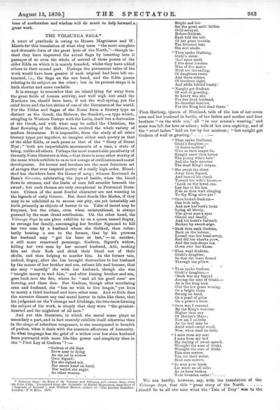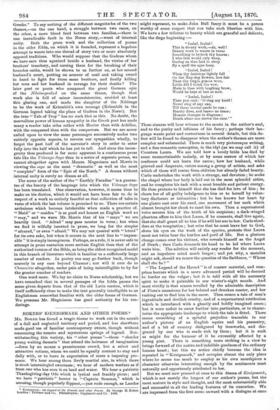THE VOLSUNGA SAGA.*
A DEBT of gratitude is owing to Messrs. Magmisson and W. Morris for this translation of what they term "the most complete and dramatic form of the great lyric of the North,"—though in- deed they have improved the actual Saga by inserting into it passages of or even the whole of several of those poems of the older Edda on which it is mainly founded, whilst they have added others in their second part. Perhaps the permanent value of the work would have been greater if each original had been left un- touched, i.e., the Saga on the one hand, and the Edda poems relating to its subject on the other ; but in its present shape it is both shorter and more readable.
It is strange to remember that an island lying far away from the great fields of human activity, and well nigh lost amid the Northern ice, should have been, if not the well-spring, yet the chief focus and the last shrine of one of the literatures of the world. For the Eddas and Sagas of the Norse form a literary type as distinct as the Greek, the Hebrew, the Sanskrit,—a type which, mingling in Western Europe with the Latin, itself but a derivation of the Greek, and with what may be called the Christian, the final flowering of the Hebrew, has evolved the whole variety of modern literatures. It is impossible, from the study of all other literary types put together, to imagine either such poetry as that of the older Edda, or such prose as that of the "Story of Burnt Njal ; " both are imperishable monuments of a race, a state of being, unlike all others. Perhaps the most remarkable peculiarity of the earlyNorse literature is this,—that there is none other worthy of the name which exhibits to us so low a stage of civilization and moral development. Its heroes and heroines are the most ferocious set of savages that ever inspired poetry of a really high order. Blood- shed has elsewhere been the theme of song ; witness Bertrand de Born's Sirventes, celebrating the joys of battle, when the blood flows in streams, and the limbs of men fall asunder beneath the sword ; but such themes are only exceptional in Provencal litera- ture. Crimes of the most fearful character are not wanting in the legends of early Greece. But demi-fiends like Medea, if they may be so exhibited as to arouse our pity, are yet invariably set forth primarily as objects of horror to us. Tales of incest may be frequent, but the crime, even when unintentional, is always pursued by the most dread retribution. On the other hand, the Visisunga Saga in one place exhibits to us a queen named Sogny, to revenge her family, encouraging her brother Sigmund to kill her two sons by a husband whom she disliked, then volun- tarily bearing a son to the former, that by his prowess her husband may "get his bane at last," — in another, -a still more renowned personage, Gudrun, Sigurd's widow, killing her two sons by her second husband, Atli, making him eat their flesh and drink their blood out of their skulls, and then helping to murder him. In the former tale, indeed, Sogny, after she has brought destruction to her husband by the means of her brother and son, refuses life and honour, that she may "merrily" die with her husband, though she was 4 naught merry to wed him," and after kissing brother and son, goes back into the fire, where he "and all his good men" are burning, and there dies. But Gudrun, though after murdering sons and husband, she "has no wish to live longer," yet lives to marry a third husband and have other sons. And so little does the narrator discern any real moral horror in tales like these, that his judgment on the Volsungs and Giukings, the two races forming the subject of his work, is simply that they were "the greatest- hearted and the mightiest of all men."
And yet this literature, in which the moral sense plays so secondary a part, and in fact scarcely exhibits itself otherwise than in the shape of relentless vengeance, is one unsurpassed in breadth of pathos, when it deals with the common affections of humanity. In what language has the grief of a widow over her slain husband been portrayed with more life-like power and simplicity than in the "First Lay of Gudrun "?
:- "Gudrun of old days Drew near to dying As she sat in sorrow Over Sigurd;
Yet she sighed not, Nor smote hand on hand, Nor wailed she aught As other women.
• • • • •
Volsunga Saga: the Story of the Volsungs and Niblungs, with certain Songs from the Elder Edda. Translated from the Icelandic by Eirfkr Magnifsson, translator of "Legends of Iceland"; and William Morris, author of " The.Earthly Paradise.' London: F. S. Enifl. 1870.
Bright and fair Sat the great earls' brides, Gold-arrayed, Before Gudrun.
Each told the tale Of her great trouble, The bitterest bale She erst abode.
4 Then apple Gillian,
Giuki's sister, 'Lo! upon earth I live most loveless Who of five mates Must see the ending, Of daughters twain And three sisters, Of brethren eight, And abide behind lonely.'
Naught gat Gudrun Of wail or greeting, So heavy was she For her dead husband, So dreadful-hearted, For the King laid dead there.'
Then Herborg, Queen of Hunland, tells of the loss of her seven sons and her husband in battle, of her father and mother and four brothers "on the wide sea," all "in one season's wearing," and none was left for love or solace ; tells of her own captivity, and of the "cruel lashes" laid on her by her mistress ; "but naught gat Gudrun of wail or greeting." . . . . :—
"Then spoke Gullrond, Giuki's daughter,— '0 foster-mother !
Wise as thou mayst be, Naught canst thou better The young wife's bale.' And she bade uncover The dead King's corpse.
" She swept the sheet Away from Sigurd, And turned his cheek Toward his wife's knees,— ' Look on thy loved one, Lay lips to his lips, E'en as thou wert clinging To thy King alive yet !'
"Once looked Gudrun— One look only,
And saw her lord's locks Lying all blood',
The great man a eyes Glazed and deadly, And his heart's bulwark Broken by sword-edge.
"Back then sank Gudrun, Back on the bolster, Loosed was her head-array, Red did her cheeks grow, And the rain-drops ran Down over her knees.
"Then wept Gudrun, Giuki's daughter, So that the tears flowed Through the pillow.
. . . . . Then spake Gudrun, Giuki's daughter, 'Such Such was my Sigurd Among the sons of Giuki,-
As is the king leek O'er the low grass waxing, Or a bright stone Strung on band, Or a pearl of price On a prince's brow.
"Once was I counted By the King's warriors Higher than any Of Herjan's Maya; Now am I as little As the leaf may be Amid wind-swept wood, Now, when dead he lieth.
"I miss from my seat I miss from my bed My darling of sweet speech. Wrought the eons of Giuki, Wrought the sons of Giuki This sore sorrow, Yea, for their sister, Most sore sorrow, "So may your lands Lie waste on all sides As ye have broken Your bounden oaths !" . . . .
We can hardly, however, say, with the translators of the Vitisunga Saga, that this "great story of the North should be to all our race what the Tale of Troy' was to the Greeks." To say nothing of the different magnitudes of the two themes,—on the one hand, a struggle between two races, on the other, a mere blood fend between two families,—there is one ineradicable fault in the Norse story, —want of internal unity. Both the prose work and the collection of poems in the older Edda, on which it is founded, represent a hopeless attempt to weave into one thread of story two or more absolutely opposed traditions. Who would suppose that the Gudrun whom we have seen thus agonized beside a husband, the victim of her brothers' treachery, and cursing them for the breaking of their bounden oaths, would be shown to us further on, at her second husband's court, putting on armour of mail and taking sword in hand to fight for those same brothers, and finally killing her sons and her husband in revenge for their deaths ? The later poet or poets who composed the great German epic of the Nibelungenlied on the same theme, though that work also is full of minor inconsistencies, avoided at least this glaring one, and made the slaughter of the Niblungs to be the work of Kriernhilt's own revenge (Kriemhilt in the German legend taking the place of Gudrun in the Norse). But the true "Tale of Troy" has no such blot as this. No doubt, the marvellous power of human sympathy in the Greek poet has made many a reader take sides rather with Hector than with Achilles, with the conquered than with the conquerors. But we are never called upon to view the same personages successively under two entirely opposite aspects, to reverse our sympathies wholly, to forget the past half of the narrator's story in order to enter fully into the half which he has yet to tell. And since the incon- gruity thus produced is far more apparent in a continuous prose tale like the Volsunga Saga than in a series of separate poems, we cannot altogether agree with Messrs. Magmisson and Morris in viewing the saga as the most " dramatic " as well as the most "complete" form of the "Epic of the North." A drama without internal unity is surely no drama at all.
The name of the author of the "Earthly Paradise" is a guaran- tee of the beauty of the language into which the Volsunga Saga has been translated. One observation, however, it seems time to make on his diction, which it would not have been fair to do in respect of a work so entirely fanciful as that collection of tales in verse of which the last volume is promised to us. There are certain archaisms which become intolerable when made a practice of. "Maid" or " maiden " is as good and honest an English word as "may," and we warn Mr. Morris that of his " mays " we are heartily tired. " Adrad " may pass muster in verse ; but when we find it wilfully inserted in prose, we long for the simpler " afeared," or even "afraid." We may not quarrel with "Jetted" for its own sake, but when it occurs in the next line to " impass- able " it is simply incongruous. Perhaps, as a rule, it is never safe to attempt in prose narration more archaic English than that of the authorized version of the Bible, as being the oldest recognized model in this branch of literature which is familiar to a sufficiently large number of readers. In poetry one may go further back, though scarcely in any case beyond Chaucer ; nor will it ever do to Chaucerize altogether, under pain of being unintelligible to by far the greater number of readers.
One word more. We lay no claim to Norse scholarship, but we have remarked that in several passages of the Edda poems the sense given departs from that of the old Latin version, which is itself sufficiently close to make the text generally intelligible to an Englishman somewhat familiar with the older forms of German. We presume Mr. Magmisson has good authority for his ren- derings.































 Previous page
Previous page